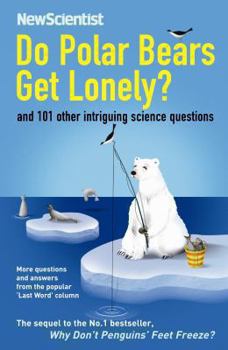Do Polar Bears Get Lonely?: And 110 Other Questions
Select Format
Select Condition 
Book Overview
Do Polar Bears Get Lonely? is the third compilation of readers' answers to the questions in the 'Last Word' column of New Scientist, the world's best-selling science weekly. Following the phenomenal... This description may be from another edition of this product.
Format:Paperback
Language:English
ISBN:1846681308
ISBN13:9781846681301
Release Date:January 2008
Publisher:Profile Books(GB)
Length:232 Pages
Weight:0.40 lbs.
Customer Reviews
3 ratings
Educations, fun & easy to read
Published by Thriftbooks.com User , 14 years ago
A series of short Q & A from the well-known Magazine column. These are fascinating, well researched and a good book to read in little bits & pieces. Enjoyable and fun science trivia. Good book for the "reading room" the bus, train, etc.
Now That's an Interesting Question!
Published by Thriftbooks.com User , 15 years ago
DO POLAR BEARS GET LONELY? is the latest offering of oddball questions and their equally fascinating answers from the English weekly NEW SCIENTIST. Drawn from actual questions sent into the magazine's 'Last Word' columnist, DO POLAR BEARS GET LONELY? will be welcomed by trivia buffs and Renaissance men/women alike. Editor Mick O'Hare divided the 100-odd questions into chapters covering 'Food and Drink,' 'Domestic Science,' 'Our Bodies,' 'Plants and Animals' and so on. Each question is posed as received and then followed by one or more replies from other readers, some of whom are educators. Paging through the book is a delight. Did you ever wonder why cooked food tastes different after it cools? Have you ever pondered why it's easy to put on the pounds as you age and even harder to take off that weight? Are you wondering if your mom was right in warning you about cracking your knuckles? How come it's so easy to balance on a moving bike but almost impossible to stay upright when you stop? As Mr. Spock would say: "Fascinating!" Like previous NEW SCIENTIST Q & A books, DO POLAR BEARS GET LONELY? is both informative and FUN. Recommended for all lovers of information.
Another great selection of questions answered
Published by Thriftbooks.com User , 15 years ago
Following the success of Does Anything Eat Wasps?: And 101 Other Unsettling, Witty Answers to Questions You Never Thought You Wanted to Ask and Why Don't Penguins' Feet Freeze?: And 114 Other Questions, this volume offers further questions and answers from the world of science. Although the titles of all three books are wildlife questions, the subjects raised cover many different aspects of science. In this book, the first section is about food and drink and the first question asks why crown caps on beer bottles always have 21 sharp bits. To be honest, I don't think I ever counted how many there were, but the question is rewarded with two answers that tell you everything that you could wish to know. It appears that 21 is now a worldwide standard although early caps had 24. The second section is titled domestic science, and as a user of striped toothpaste I was particularly interested in the explanation of how this works. Another question in this section, this time about a cut-glass accident, initially produced incorrect responses, but the final answer is correct. The third section explores our bodies. One of the questions is from somebody who finds it easier to sleep while travelling than in bed. This could be caused by thinking too much. Some people find that, once the day is done and they get into bed, that is the one opportunity they have to think clearly without any distractions. I'm assuming that such people don't have a partner, although the book doesn't mention this. After a section titled Feeling OK?, which is mostly about viruses, there's the plants and animals section featuring the title question. That question is answered with explanations of how some creatures hunt alone (because food supplies are limited) while others form social groups (for safety in numbers). Other interesting questions ask about cats liking fish but not swimming, and about whether dogs know what they are. Further sections about our planet and universe, transport and weather. Finally, there is a best of the rest section, covering questions that don't belong in any other defined categories. One question here is about lottery numbers, while another is about ancestry. In the latter, somebody says that as everybody has two parents and you only have to go back 10 generations to have over 1,000 ancestors, you don't have to go back too far for the number of ancestors to exceed the number of people that ever lived. He asks what the flaw in his logic is, but I'm actually surprised he asked the question as the answer is so obvious, Yes, folks, a lot of those ancestors are actually the same people. We're all inter-related many times over if you go back far enough, although actual historical records are limited, so you can`t assemble a comprehensive family tree. This is an entertaining book that is well up to the standard of the two previous volumes. Given the unlimited potential material, I guess that the series may expand further as the years go by.






